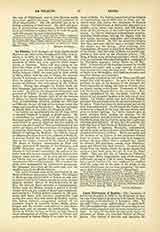

Laurentie, PIERRE-SEBASTIEN, French publicist; b. at Houga, in the Department of Gers, France, January 21, 1793; d. February 9, 1876. He went to Paris in the early part of 1817, and on June 17 of the same year entered the famous pious and charitable association known as “La Congregation”. Through the patronage of the Royalist writer Michaud, Laurentie became connected with the editorial staff of “La Quotidienne”, in 1818; and in 1823 he was appointed Chief Inspector of Schools (inspecteur general des etudes), with the functions of which office he was able to combine his work as a publicist. His earliest writings won for him a great reputation. They were: “De l’eloquence publique et de son influence” (1819); “Etudes litteraires et morales sur les historiens latins” (1822); “De la justice au XIXe siecle” (1822); “Introduction a la philosophie” (1826); “Considerations sur les constitutions democratiques” (1826). The complaint was made against the last-named of these works, that it was aimed at the Villele Ministry, and censured its legislation in regard to the press. This charge, together with the attacks on the Ministry which appeared in “La Quotidienne” and the fact of Laurentie’s friendly relations with Lamennais, led to Laurentie’s dismissal from the office of Chief Inspector of Schools (November 5, 1826). “La Quotidienne” supported the Martignac Ministry until it issued the decrees of June 16, 1828, against the Jesuits, and the petits seminaires. Laurentie vigorously opposed these decrees. He purchased the old Benedictine college of Ponlevoy, which had existed f or more than seven centuries and which, with the colleges of Juilly, Soreze, and Vendome, Napoleon had permitted to continue in existence side by side with the university. Laurentie’s plan was to take advantage of this exceptional official authorization (which constituted a breach in the wall of the state university monopoly) to insure the prosperous existence of one independent educational institution. His work, “Sur l’etude et l’enseignement des lettres”, published in 1828, was understood to embody the program which he proposed to follow at Ponlevoy.
After 1830, Laurentie, defeated politically, devoted all his efforts as a publicist to three great causes: (I) freedom of education; (2) Legitimism; (3) the defense of religion. (I) For the first of these, we may mention his “Lettres sur l’education” (1835-37), his “Lettres sur la liberte d’enseignement” (1844), and the part he played, in 1849 and 1850, in regard to the commission which prepared the Falloux Law; also his treatise, “L’Esprit chretien clans les etudes” (1852), his book on “Les Crimes de l’education francaise” (1872), and his successful efforts for freedom of higher education (1875). (2) In support of the second of these causes he wrote the pamphlet, “De la legitimite et de l’usurpation” (1830), the book “De la revolution en Europe” (1834), “De la democratie et des perils de la societe” (1849), “La Papaute” (1852), “Les Rois et le Pape” (1860), “Rome et le Pape” (1860), “Rome” (1861), “Le Pape et le Czar” (1862), “L’Atheisme social et l’Eglise, schisme du monde nouveau” (1869). Inspired by the same cause, Laurentie also contributed, under the Monarchy of July, to “Le Renovateur” and “La Quotidienne”. Again, between 1848 and 1876, the battle for the principle of Legitimism went on day after day in the columns of the Royalist “L’Union”, and in connection with this campaign Laurentie’s “Histoire des dues d’Orleans” was published in 1832, handling the Orleans family with great severity, and followed by the ten volumes of his “Histoire de France” (1841-55), a kind of historical illustration of his political doctrines. (3) As early as 1836 Laurentie conceived the idea, in defense of religion, of a Catholic encyclopedia which he prefaced with a Catholic theory of the sciences. In 1862 he published a. pamphlet attacking scientific atheism. His “Histoire de l’Empire Romain” (1862) is an apology for infant Christianity, and his “Philosophie de la priere” (1864) contains the outpouring of a devout soul.
As an octogenarian, Laurentie was the confidant of the Comte de Chambord, whose rights he daily championed in “L’Union”. His “Souvenirs”, left unfinished at his death, were published by his grandson in 1893. “He was an honor to his party and to the press”, wrote Louis Veuillot. From the beginning to the end of his career he was an anti-Gallican monarchist, never seeking in his theory of the Throne and the Altar a means of making the Altar subservient to the Throne, but advocating the liberty of the Church and of education.
GEORGES GOYAU

